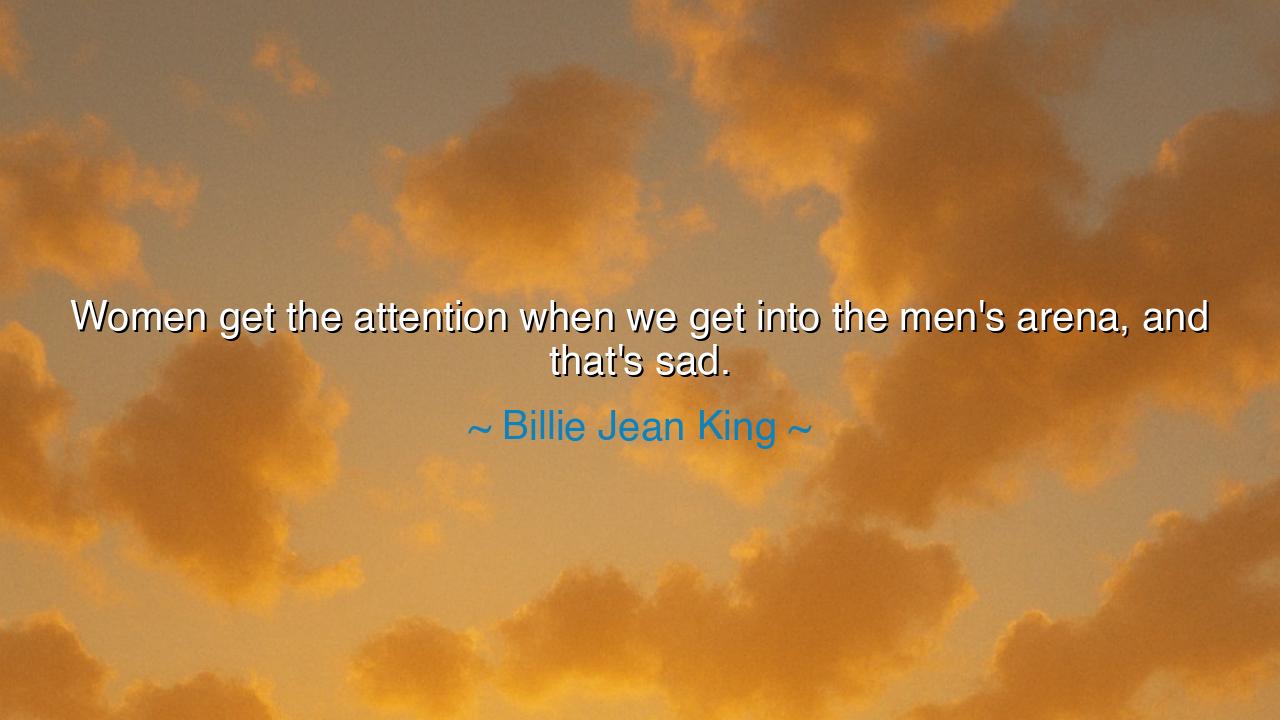
Women get the attention when we get into the men's arena, and






In the stirring and unflinching words of Billie Jean King, a champion not only of tennis but of justice itself, we find a truth that pierces through the ages: “Women get the attention when we get into the men’s arena, and that’s sad.” These are not the words of bitterness, but of clarity — the insight of one who has stood in the glare of triumph and seen the shadows that remain. King, a warrior of both sport and equality, speaks not merely of tennis courts and trophies, but of the deeper struggle for recognition, for the right of women’s greatness to be honored on its own terms, without the need to borrow legitimacy from the world of men.
Her words were born in a time of awakening — the mid-twentieth century — when women in all fields were beginning to demand the rights and respect long denied them. Billie Jean King herself became a living emblem of this battle during the legendary “Battle of the Sexes” in 1973, when she faced and defeated Bobby Riggs, a self-proclaimed chauvinist who claimed that women’s tennis could never match the strength and skill of men’s. The world watched, not merely for the outcome of a match, but for a verdict on womanhood itself. When she won, the victory resounded like thunder — yet her quote reminds us of the tragedy behind the celebration: that women’s triumphs, no matter how mighty, are often only seen when measured against men.
In this, King speaks to a sorrow that transcends sports. She laments that the world’s gaze is still conditioned to notice women only when they step into spaces built by and for men — the “men’s arena.” Whether in business, politics, art, or science, the story repeats: a woman’s achievement is often hailed as exceptional only because it breaks into a male-defined sphere. This is what she calls “sad” — not because such victories lack value, but because they reveal how deeply the world has forgotten that women’s arenas, too, are sacred, that their strength and creativity need no borrowed light.
The ancients, though often bound by their own hierarchies, understood this truth more profoundly than we remember. In the myths of Greece, there was Athena, goddess of wisdom and war, who fought not to imitate the gods, but to show that intellect and strategy were as divine as brute force. In Egypt, there was Isis, who ruled not through conquest, but through compassion and cunning, rebuilding what the gods had destroyed. These ancient figures remind us that the feminine principle has always carried its own power — not weaker than the masculine, but different in kind, equally essential to the harmony of creation. To revere only one is to live in imbalance.
Yet, through the centuries, the feminine voice has been silenced, dismissed, or measured against the masculine ideal. When King says women “get attention” only in the men’s arena, she reveals how society still clings to that imbalance — a world where validation comes from comparison, not from truth. And yet, her words are not only a lament; they are a challenge. For within them lies the call to create new arenas, to redefine what greatness means. She asks us to imagine a world where a woman’s excellence does not need to cross boundaries to be seen, where her strength is recognized not as an exception, but as a constant.
Consider, too, the lesson of Marie Curie, who became the first woman to win a Nobel Prize — and then the first person, man or woman, to win two. Her discoveries in radiation changed the course of science, yet she had to labor in obscurity, denied institutional support, often doubted because she was a woman. Only when her achievements broke through the walls of the male-dominated academy did the world finally turn its eyes toward her. Like Billie Jean King, she was praised not simply for her brilliance, but for proving she could stand among men. Yet her true greatness lay not in comparison, but in transcendence — in the quiet conviction that her worth was not given by others, but born of her own purpose.
The lesson, then, is clear and enduring: True equality is not achieved by entering the man’s arena, but by expanding the human one. The goal is not imitation, but integration — the recognition that every person, regardless of gender, carries within them the capacity for excellence, leadership, and vision. If the world gives attention only to women who break into male domains, then it is the world that must evolve. And we, inheritors of Billie Jean King’s legacy, must continue that work — by building spaces where every voice, every strength, and every story is valued in its own right.
So let us take these words to heart — and not with sorrow alone, but with resolve. Let us honor those who step into the so-called “men’s arena,” but also build new courts, new halls, new kingdoms where power is shared and worth is intrinsic. For Billie Jean King’s lament is, in truth, a prophecy: one day, the attention given to women will not come from comparison, but from the recognition that their light has always been its own sun. When that day comes, there will be no “men’s arena,” no “women’s arena,” but a single, vast field where humanity — whole, balanced, and free — plays at last as equals beneath the same sky.






AAdministratorAdministrator
Welcome, honored guests. Please leave a comment, we will respond soon